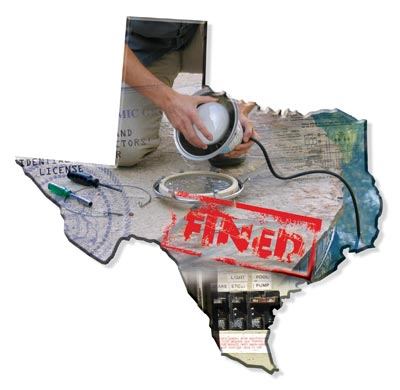When Jason Horn showed up for an ordinary service call, he never expected it would get him in trouble with the state — and potentially put him out of business.
“It all started when I called the warranty company to get the work order approved,” said the Mabank, Texas-based independent pool service contractor. The company said the repair wasn’t covered. Apparently, there had been a miscommunication with the homeowner about the nature of the work.
Horn found himself caught in the middle of an argument between the warranty company, which insisted he collect a fee, and the customer, who refused to pay. His efforts to diffuse the situation didn’t help.
Then, as so often happens, the pool technician ended up being blamed. The homeowner complained to the Better Business Bureau and the state’s real estate commission. Before long, the Texas Department of Licensing and Registration got involved.
Once on TDLR’s radar, Horn became entangled in a situation that leaves his business essentially benched.
However, the problem has nothing to do with warranties. Since March, TDLR has required that every pool technician performing electrical work obtain an updated Texas Residential Appliance Installer license, which entails passing an exam based on the 2008 National Electrical Code handbook. Local industry groups have been working to spread the word about the test, but sources say the vast majority of Texas pool professionals still haven’t taken it.
Though Horn had pre-registered and passed the background check for the exam, he had yet to complete it. Now he’s been caught operating without the updated license and awaits a verdict from TDLR’s legal department. He could receive a written warning, or face a fine as high as $5,000.
Unfortunately, that may be only the beginning. “Once the department has given you a citation and can prove that you’re out of compliance, they have the legal right to audit all your records, and cite you retroactively for every past instance of unlicensed work,” said Bob Iovanelli, president of Blue Horizon Pools in Plano, Texas.
Aside from small cleaning jobs, Horn’s service route is out of business until he passes the test. In the meantime, he’s had to find other work to pay the bills.
In hindsight, Horn wishes he’d made the test a higher priority. “I had this attitude of ‘If I play by every rule except this one, I’ll be OK,’” he said. “Of course, that was the rule that came back to bite me.”
He was far from alone in his mindset. Thousands of techs know about the requirement, yet continue to put off taking the test. “I’ve been telling my friends in the industry about the need to get licensed,” Iovanelli said. “They’re saying, ‘Yeah, we know, but we haven’t had a chance yet. We’ll get around to it.’”
The TDLR seems to be losing patience with this attitude and is becoming more aggressive in its pursuit of unlicensed operators.
On the Department’s Website, a list of license-related citations grows by the day, and the agency is reportedly even looking on Websites such as Angie’s List and Craig’s List for potential violators.
Noncompliance may carry even greater consequences for the industry as a whole. The lack of licensed service techs has caused warranty companies to hire electricians and plumbers to work on swimming pools. This has resulted in equipment being repaired by a largely untrained work force.
“These guys know how to hook up wires, but they don’t know anything else about the pump they’re working on,” Iovanelli said.




